

Saw it coming — but Trump’s own party didn’t. Hanauer. Original photo by Michael Vadon (CC BY-SA) The Republican Party is coming apart, and Donald Trump is leading the charge.
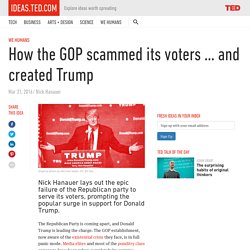
The GOP establishment, now aware of the existential crisis they face, is in full panic mode. Arianna Huffington: How to succeed? Get more sleep. Talks to watch when every conceivable bad thing has just happened to you. La leçon de bonheur d’Alain Badiou. Le professeur plaide pour une philosophie de la volonté qui ouvre l’espace des possibles, face au climat de résignation qui domine l’époque. « Tu peux, donc tu dois ».
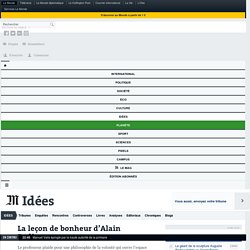
Want to sound like a leader? Start by saying your name right. Julian Treasure: 5 ways to listen better. Youtube. Linda Hill: How to manage for collective creativity. Rainer Strack: The workforce crisis of 2030. Jared Diamond: How societies can grow old better. David Kwong: Two nerdy obsessions meet. This infographic shows what it’s like to be a modern refugee. “Syrians are just looking for a quiet place where nobody hurts you,” says one refugee, who survived a capsized escape craft on his dangerous journey.
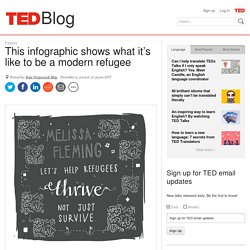
Clarice Holt, an illustrator in London, was moved by the simple, powerful truths she heard in Melissa Fleming’s TED Talk — and made these beautiful illustrations to show the personal stories and shattering data of the modern refugee crisis. “An illustration can be like Mary Poppins’ spoonful of sugar,” says Holt. “If someone is captivated by an image, they can absorb so many things along with it.” Holt began the sketch in pencil, then used a brush pen to draw the images. She cleaned it all up using a Wacom tablet and her laptop. Melissa Fleming saw the sketches on Twitter.
As Holt says, “I hope it makes people want to go and give the gift of their talents, whatever those may be, to people who need them to rebuild their lives. Fanfare shares art, music, video remixes and more created by TED fans around our content. Amber Case: We are all cyborgs now. Daniel Kish: How I use sonar to navigate the world. Sherry Turkle: Connected, but alone? Daniel Kish: How I use sonar to navigate the world. 5 talks full of weird facts about sex. Now playing.
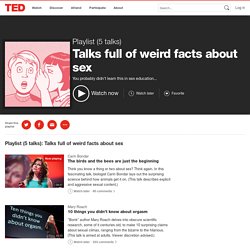
TEDxISTEC" Video at TEDxTalks. Benedetta Berti: The surprising way groups like ISIS stay in power. Ed Yong: Zombie roaches and other parasite tales. Simon Sinek: How great leaders inspire action. The history of tattoos - Addison Anderson. Claim your independence. Success : TED Radio Hour. Talks to watch when you don't know what to do with your life. Should you stop eating fish? Oceanographer (and TED Prize winner) Sylvia Earle (TED Talk: My wish: Protect our oceans) has spent half a century campaigning to save the world’s seas.
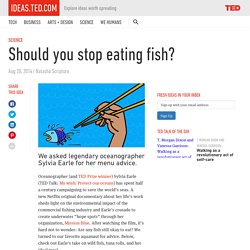
A new Netflix original documentary about her life’s work sheds light on the environmental impact of the commercial fishing industry and Earle’s crusade to create underwater “hope spots” through her organization, Mission Blue. After watching the film, it’s hard not to wonder: Are any fish still okay to eat? We turned to our favorite aquanaut for advice. Below, check out Earle’s take on wild fish, tuna rolls, and her ideal meal. To restore the ocean ecosystem, you’re saying we must put an end to overfishing and bottom trawling, which you liken to “catching songbirds with a bulldozer.” Except for those living in coastal communities — or even inland if we’re talking freshwater species — for most people, eating fish is a choice, not a necessity. Paul Piff: Does money make you mean?
A brief history of melancholy - Courtney Stephens. Robert Burton attempted to gather the totality of human thinking on sadness and melancholy in his 1621 book The Anatomy of Melancholy.
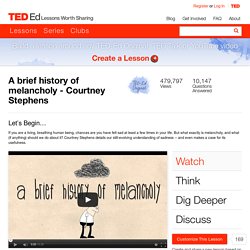
Similar to the approach in this video, Burton gathered widely in thinking about the subject. This includes quotes from thinkers and literature, anatomical drawings, and Burton’s own meditations. Check this page of quotes by Robert Burton for more insight into his thinking! Russell Foster: Why do we sleep? Simon Sinek: Why good leaders make you feel safe. Elizabeth Gilbert: Success, failure and the drive to keep creating. Math talks to blow your mind. Understanding world economics. The Money Paradox : TED Radio Hour. Slow down! Enjoy life. Yuval Noah Harari: What explains the rise of humans? John Green: The nerd's guide to learning everything online. Luke Syson: How I learned to stop worrying and love "useless" art. Comment rebrancher son cerveau ?
We ask 5 people creating the future: so, what it will be like? You could say we at TED live in a permanent tomorrowland, so at our recent TED2015 conference, Disney commissioned TED with filmmaker Jesse Dylan to shoot some attendees and speakers speaking about the future for a promo for the movie Tomorrowland.
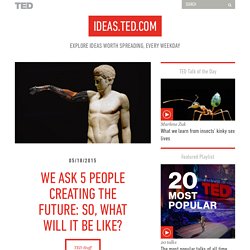
(Full disclosure, Disney is also an advertiser on ted.com.) But once the ad for the movie was cut together, we had some amazing leftovers — short interviews with people saying even more weird and interesting stuff about what they think the future will bring to their world (and ours). It was too good not to show. Pourquoi je ne crois pas à l'entreprise libérée. Plato’s Allegory of the Cave - Alex Gendler. Want to read the Allegory of the Cave in its complete format?
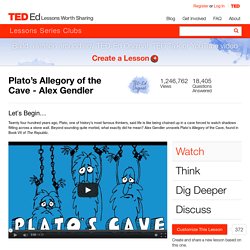
Go to this site and get started. To better understand the allegory’s larger context, try reading the rest of The Republic by Plato and these classic lectures. Then, check out this modern scientific interpretation of what it tells us about human knowledge. Want to see two different visual representations of this allegory? Watch this version of Plato’s allegory in clay animation or this one narrated by Orson Wells! You may also want to read a summary of the Theory of Forms and how it relates to language. Finir un rêve inachevé. Own your face. A portrait of TEDxSouthBend speaker Robert Hoge “Most of us don’t own our faces.
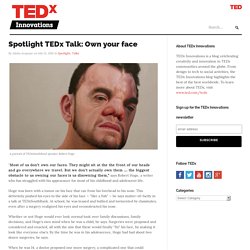
They might sit at the the front of our heads and go everywhere we travel. Why the Pope’s embrace of science matters. On June 18, Pope Francis issued the encyclical Laudato Si: On care for our common home.
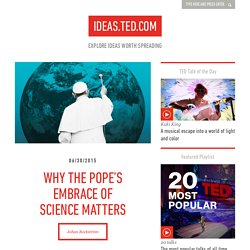
The letter has been widely praised for supporting the science on climate change. L'éloge de la lenteur. Vous avez une réunion ? Allez vous promener ! D'où viens-tu? Le pouvoir des introvertis. Fellow Aomawa Shields looks for life on other planets. Aomawa Shields is an astrobiologist who studies the potential for life on other planets. She also uses her training as an actor to teach middle school girls about the joys of astronomy. Photo: Ryan Lash/TED Aomawa Shields is a woman of “contradictions.”
An astronomer and astrobiologist, she searches for exoplanets where life might exist by using computer models to calculate the kind of atmosphere they’d need to support it. And she’s also a classically trained actor, who — through her organization Rising Stargirls — teaches astronomy to middle school girls of color using theater, writing and visual art to spark their imaginations.
She talks to the TED Blog about how the threads of her life — scientist, actor, role model and educator — weave together into a unique whole. Talks to restore your faith in humanity. What really happens to the plastic you throw away - Emma Bryce. If you watched this video, you’re probably interested in how plastics are made, and what impact they have on the environment. For starters, you might want to watch this video that shows you how plastic bottles are produced. The American Chemistry Council also has some helpful guidelines on how the material is manufactured, what different types there are, and what role monomers and polymers play in the manufacturing process. (What are monomers and polymers anyway? Martin Rees: Can we prevent the end of the world? The language of lying - Noah Zandan. Detection deception experts such as Pamela Meyer, in her popular book Liespotting argue that there are behavior cues everyday people can use to spot lying. Hear Pam discuss her book and ideas at this NPR link on the TED Radio Hour and listen to: Can You Spot A Liar?
Scroll down at this site and check out the related story links. Click here and see some of the common clues that a lying person might give away that would allow you to detect that they are deceiving you. But a host of reputable scientists, like John Fuerdy of the University of Toronto, question the efficacy of lie detectors: "Studies have long shown that polygraphs are remarkably unreliable, particularly for screening job applicants. As early as 1965, a congressional committee concluded that there was no evidence to support the polygraph's validity; a 1997 survey in the Journal of Applied Psychology put the test's accuracy rate at only 61 percent. AJ Jacobs: The world's largest family reunion … we're all invited! The evolution of the human eye - Joshua Harvey. The evolution of the human eye has long been regarded as a contentious issue.
It was believed to be an example of irreducible complexity – that is something that could not have evolved, because any precursor to the fully evolved form would be non-functioning. Wikipedia gives a good overview of the concept. This lesson shows that not only do evolutionary precursors to the eye exist, but that there is a huge diversity in the structure and function of eyes in the animal kingdom. An ophthalmologist in America, Tim Root, has created a great video on the evolution of the eye, exploring it in more detail, with some great animation. The study of the evolution of the human eye not only a worthwhile in itself, but as a platform to explore evolution as a whole, the diversity of the animal kingdom, adaptation and so on.
The study of the evolution of other structures in the animal kingdom is equally interesting. Bill T. Jones: The dancer, the singer, the cellist ... and a moment of creative magic. L’ambition féminine. 10 tips for better slide decks. When your slides rock, your whole presentation pops to life.
At TED2014, David Epstein created a clean, informative slide deck to support his talk on the changing bodies of athletes. Photo: James Duncan Davidson/TED Aaron Weyenberg is the master of slide decks. Our UX Lead creates Keynote presentations that are both slick and charming—the kind that pull you in and keep you captivated, but in an understated way that helps you focus on what’s actually being said. The Moneyball Effect: How smart data is transforming criminal justice and more. Anne Milgram reveals what happened when New Jersey moneyballed its criminal justice system. Photo: Marla Aufmuth When Anne Milgram became the Attorney General of New Jersey in 2007, she was stunned to find out just how little data was available on who was being arrested, who was being charged, who was serving time in jails and prisons, and who was being released.
Anne Milgram: Why smart statistics are the key to fighting crime “It turns out that most big criminal justice agencies like my own didn’t track the things that matter,” she says in today’s talk, filmed at TED@BCG. “We didn’t share data, or use analytics, to make better decisions and reduce crime.” Andrew McAfee: What will future jobs look like? Gayle Tzemach Lemmon: Women entrepreneurs, example not exception. 10 tips for better slide decks. David Bolinsky: Visualizing the wonder of a living cell.
Amber Case: We are all cyborgs now. The 2,400-year search for the atom - Theresa Doud. Ed and Periodic Videos. Nos vies valent plus que leurs profits: Bruno Tesson at TEDxPantheonSorbonne. Vincent Cochetel: I was held hostage for 317 days. Here's what I thought about… Isaac Getz : Libérer l'entreprise. The funniest TED Talks. Now playing. Einstein's brilliant mistake: Entangled states - Chad Orzel. Vinciane Despret : "Notre relation aux animaux s'est intensifiée au fil du temps" - Sciencesetavenir.fr.
Something surprising happens to your body when you freedive. Dan Ariely: Our buggy moral code. Helder Guimarães: A magical search for a coincidence. How playing an instrument benefits your brain - Anita Collins. The connections between brain research and music have been ongoing for the past two decades, but there are actually a lot of different areas within the research, and it is easy to confuse them. Firstly there is the area of music and the brain, which is about how we process music in our brains. Malcolm Gladwell: Choice, happiness and spaghetti sauce. Bosnian photographer Ziyah Gafić documents the aftermath of war. Bosnian photojournalist Ziyah Gafić photographs the aftermath of conflict. (Watch his TED Talk, “Everyday objects, tragic histories.”) Goals Suck: Why Building Habits and Systems Makes Sense. Even if New Year’s Resolutions aren’t your thing the start of a new year is a good time to reflect and evaluate your progress in the past 12 months.
But when it comes to making big changes in your life, don’t set goals. The many meanings of Michelangelo's Statue of David - James Earle. Bosnian photographer Ziyah Gafić documents the aftermath of war. Heribert Watzke: The brain in your gut. Sans titre. What is the difference between "a hearty welcome" and "a cordial reception"? In a brief, action-packed history of the English language, Kate Gardoqui explains why these semantically equal phrases evoke such different images. Dan Ariely: What makes us feel good about our work? Ben Ambridge: 10 myths about psychology: Debunked. 1905, l’année où Einstein bouleverse la physique moderne - Sciencesetavenir.fr. PENSEE. Il y a 110 ans tout juste, un très jeune chercheur – même pas 26 ans – allait révolutionner en un an seulement, notre compréhension de l’Univers et ce pour des décennies !
De sorte qu’encore aujourd’hui les physiciens sont chaque jour épatés par le brio de ses démonstrations, la justesse de ses prédictions, et les épistémologues n’en finissent pas d’étudier le cheminement de sa pensée. Matthieu Ricard: How to let altruism be your guide. Evan Grant : rendre le son visible avec la cymatique. The benefits of a good night's sleep - Shai Marcu. Why do we cry? The three types of tears - Alex Gendler. IDF In TedMed - IDF Leadership And Saving Lives. Diana Nyad: Never, ever give up. Daniel Goldstein: The battle between your present and future self.
John Wooden: The difference between winning and succeeding. Frans de Waal: Moral behavior in animals. Juan Enriquez: The next species of human. Ariel Garten: Know thyself, with a brain scanner. George Dyson: The birth of the computer. Le cerveau, créateur de temps.